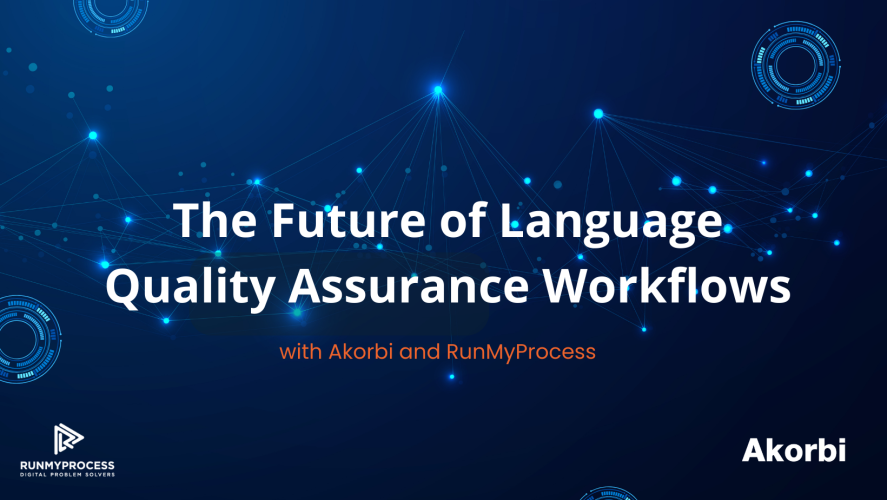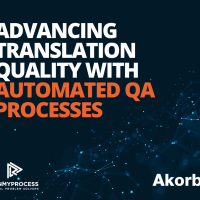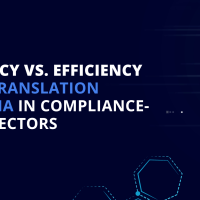
Technology
Jan 2
The Future of Language Quality Assurance with Akorbi and RunMyProcess
Language Quality Assurance and its Importance
Quality assurance in language is extremely important in ensuring clear, concise, and effective communication. It helps eliminate misunderstandings, prevents potential errors, and fosters trust between different parties.
This importance is amplified in compliance-focused industries such as finance and healthcare. In these sectors, precision and accuracy in language use are not just about clarity — they are legal and ethical necessities. Misinterpretations can lead to significant financial mishaps in finance, for instance, or severe health consequences in healthcare.
Understanding Language Quality Assurance (LQA)
As we emphasize the significance of accuracy and quality in translations, let's take a moment to discuss into the process that ensures such standards. Language Quality Assurance (LQA) – a meticulous process t- plays a vital role in guaranteeing the precision, consistency, and relevance of content in a specific language. With the involvement of linguistic experts, LQA entails a series of checks and validations to verify that translated content aligns with grammatical and syntactical norms, as well as contextual appropriateness and cultural nuances.
Traditional Approaches to LQA
Traditionally, Language Quality Assurance (LQA) has been a labor-intensive and time-consuming process, often involving a team of linguistic experts manually reviewing and verifying the translation content. This conventional approach, while effective in maintaining language integrity, oftentimes comes with a set of challenges. For starters, it requires significant human resources, which can be both costly and difficult to scale. The process is also vulnerable to human error, given its reliance on manual checks. Additionally, the process can be slow and inefficient, particularly for large volumes of text or complex projects involving multiple languages. Cultural nuances and contextual subtleties add another layer of complexity, requiring in-depth knowledge and understanding. These inherent struggles with the traditional approach have prompted the search for innovative solutions that can streamline the LQA process while maintaining, if not enhancing, the level of accuracy and quality.
Modern Approaches to LQA and the Role of Technology
With the challenges of traditional language quality assurance practices in mind, there has been a noticeable shift towards modern, technology-driven methods. The use of software and artificial intelligence (AI) has transformed the process, offering accurate, efficient, and scalable solutions. By reducing dependency on manual labor and minimizing the risk of human error, these digital solutions have significantly accelerated the QA process, and their ability to handle large volumes of text in multiple languages makes them highly suitable for global businesses. These advancements provide promising solutions to the obstacles faced in traditional language quality assurance practices.
The Potential Pitfalls of Modern Quality Assurance
The caveat to digital and software quality assurance tools is that when they are not directly integrated with translation workflows, several potential issues can arise. One primary concern is the risk of manual errors during the transfer of content from one system to another. Incorrectly copied or missed content, format inconsistencies, or unintended modifications can inadvertently occur during the transfer, compromising the integrity of the original material. This disjointed process can be time-consuming, inefficient, and challenging to manage, especially with large volumes of content or multiple languages.
RunMyProcess to Streamline Quality Assurance Workflows
RunMyProcess presents a highly effective solution to this predicament by offering seamless integration capabilities. It is adept at merging with your existing systems - including custom-built ones. Its low-code platform allows you to create custom automated workflows tailored to your specific needs. For instance, approvals can be automatically sent to the next person in the chain, significantly reducing delays and potential bottlenecks. Most importantly, RunMyProcess can synchronize the quality assurance process directly into Content Management Systems (CMS). This eliminates the risks associated with manual content transfers, ensuring the integrity and consistency of your language quality assurance. The integrated, automated, and customizable nature of RunMyProcess not only enhances efficiency and accuracy in language quality assurance but also enables a more scalable and adaptable system.
Contact Us to Learn More
RunMyProcess offers a powerful, comprehensive solution that simplifies and enhances your language quality assurance workflows. Its seamless integration capabilities, customizable automation, and direct synchronization with your CMS provide an efficient, scalable, and adaptable approach to maintaining language quality and integrity, eliminating manual errors and inefficiencies. For more in-depth insight on how RunMyProcess can revolutionize your LQA workflows, contact us today.



